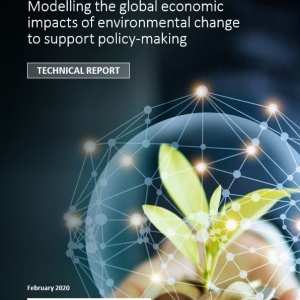
This report from the global wildlife foundation WWF assesses the global economic impacts of nature loss. It finds that under a business-as-usual scenario, global GDP in 2050 could be 0.67% lower than if six ecosystems services (crop pollination, carbon storage, marine fisheries, protection of coasts from flooding/erosion, water supply and timber production) remain unchanged - a cumulative cost of US$10 trillion. A global conservation strategy could increase global GDP by 0.02% in 2050 relative to no change in these six ecosystems services.
The report stresses that its estimates do not reflect the total cost of all environmental changes - only the effects of changes to the forests, wetlands, coral reefs and fish stocks that provide the six ecosystems services considered. It also stresses that its estimates do not account for potential tipping points beyond which ecosystems could change irreversibly.
Read the full report, Global Futures: Modelling the global economic impacts of environmental change to support policy-making, here. See also the Foodsource resource How do the climate and environment directly affect the conditions required for food production?







Post a new comment »